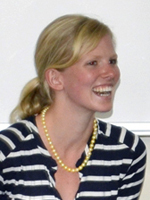
Clinic Director Mitch
Students in UW Law School’s Neighborhood Law Clinic won three court trials in one day late last month, amounting to more than $13,000 in judgments for their clients.
This semester, the NLC had nine cases set for trial, of which they secured five court victories and two out-of-court settlements. One case awaits a decision, and another trial was postponed until January.
That’s a remarkable run for the students, according to Professor Mitch, the clinic’s director. While the clinic often wins claims on behalf of its clients, he says most get settled before ever reaching trial.
The community-based clinic offers ongoing legal assistance on civil matters to low-income Madison residents. Its clients are looking to resolve rental or housing problems, wage-and-hour disputes with employers, “and a smattering of other things that crop up in the neighborhood where we’re located,” Mitch says.
The need for NLC services is great. Mitch says up to ten people a week come to its south Madison office for legal help, and the small clinic can only handle a fraction of those cases. The clinic’s experience reflects a statewide trend: a 2007 State Bar of Wisconsin study found that more than 500,000 Wisconsin residents are contending with serious civil legal issues without the benefit of representation.

Jason Krautkramer
And for Americans living at or below the poverty level, a decision in small claims court can make the difference between scraping by and not. “Our clients are hardworking. Often, they’re trying to get or keep a roof over their heads. They’re trying to get or keep a fair wage. It's so easy to be passionate about that,” says Mitch.
NLC students do all the groundwork to prepare their clients for trial, but in order to present in court, they need to complete the required number of course credits. Having fulfilled the prerequisites, third-year law student Rachel Grischke gained experience questioning witnesses and presenting opening and closing arguments under Mitch’s supervision. Jason Krautkramer, a second-year law student, worked as “second chair” in court, while Mitch argued the cases. He’ll have the credits to lead in court next semester.
In spite of the courtroom successes, winning at trial may represent only half the battle for NLC plaintiffs, because collection is up to the client, not the courts. When debtors refuse to pay what the court orders, student attorneys like Krautkramer and Grischke continue to strategize — helping clients interpret the statutes and pursuing complicated options for recovery of unpaid judgments, such as garnishing wages or assets.
“The post-collections process is another area where our clinic adds real value for clients,” says Mitch.

Rachel Grischke
Krautkramer says the clinic has helped him refine his lawyering skills, especially in the client interviewing phase, where asking the right questions means getting the most productive answers. After graduating, he’ll most likely put those skills to practice in estate planning law, but says he may continue to litigate civil cases on a pro bono basis.
“I couldn’t deal with that frustration every day,” he says. “It’s hard to watch people continue to get the short end of the stick, even after they win in court.”
But Grischke says working for the Neighborhood Law Clinic reinforced her desire to pursue a career in civil litigation, where she has noticed a hole in representation for poorer plaintiffs. “The clinic cultivated my love of civil litigating,” she says. “I’m hooked.”
Submitted by Tammy Kempfert on March 17, 2014
This article appears in the categories: Articles